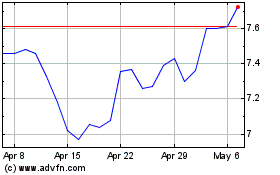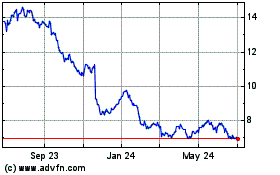China's GMO Ruling Hands U.S. Farmers New Tool in Battle Against Weeds
January 08 2019 - 1:41PM
Dow Jones News
By Jacob Bunge
China's approval of new genetically engineered crops will open a
new front in U.S. farmers' long-running war against hard-to-kill
weeds.
The approval, outlined Tuesday by Chinese officials, clears the
way for crop-seed and chemical maker DowDuPont Inc. to begin
selling to U.S. farmers new soybean seeds modified to survive a
powerful herbicide combination.
The seeds are designed for farmers struggling to stop weeds that
have developed resistance to other sprays. Resistant weeds are
spreading across the U.S. Farm Belt, cutting into farmers' harvests
and boosting their spending on chemicals.
DowDuPont's soybeans, called Enlist, awaited China's approval
for years. The U.S. Department of Agriculture in 2014 approved the
seeds for sale to U.S. farmers, but DowDuPont held off on widely
selling the seeds pending approval from China, the world's biggest
buyer of soybeans.
Tuesday's decision came as U.S. and Chinese negotiators work on
cooling a broader trade battle between the world's two largest
economies. Trade officials representing the countries have narrowed
their differences, though the two sides remain far from completing
a deal.
The decision by China's National Biosafety Committee, which also
approved herbicide-resistant crops developed by Bayer AG and
Syngenta, followed a 2017 commitment by China to hasten reviews for
U.S. biotech crops.
China's approval will help provide a new weapon against
hard-to-kill weeds like waterhemp and palmer amaranth. Such weeds
have developed resistance to glyphosate, the herbicide marketed by
Bayer under the Roundup brand. The German company last year
acquired Monsanto, which developed Roundup and pioneered
genetically engineered crops.
Since 2016 Bayer has sold soybean seeds genetically engineered
to resist dicamba, another potent herbicide pitched as a solution
to farmers' herbicide-resistant weed woes. Some farmers have blamed
dicamba for drifting onto neighboring fields and damaging crops,
though Bayer said its new formulation of dicamba is designed to
better hold where it is sprayed.
The U.S. Environmental Protection Agency in October tightened
restrictions on dicamba spraying, but allowed farmers to continue
using it. Some farmers and pesticide applicators see DowDuPont's
new soybeans as an alternative, since they are engineered to
withstand 2,4-D, a different herbicide.
"We're ready to go if we got [China's] approval now," Jim
Collins, who heads DowDuPont's agricultural business, said in
November.
Chinese officials' approvals of the new genetically engineered
crops make good on part of a trade pact between China and the U.S.
reached in May 2017. Chinese officials at the time agreed to rule
within 100 days on eight biotech crops. The country approved some,
but held off on others like DowDuPont's soybeans, frustrating U.S.
seed-industry officials who for years have complained that China's
biotech crop approval process is opaque and unpredictable.
As part of Chinese officials' Tuesday ruling, Bayer won approval
for a new variety of canola, which will help the company begin
selling it to North American farmers this year, a spokeswoman
said.
"While we welcome this news, many of these products were stuck
in China's regulatory process for many years and others were not
granted approvals, underscoring the need for continued improvement
in China's regulatory processes," she said.
Write to Jacob Bunge at jacob.bunge@wsj.com
(END) Dow Jones Newswires
January 08, 2019 13:26 ET (18:26 GMT)
Copyright (c) 2019 Dow Jones & Company, Inc.
Bayer Aktiengesellschaft (PK) (USOTC:BAYRY)
Historical Stock Chart
From Mar 2024 to Apr 2024

Bayer Aktiengesellschaft (PK) (USOTC:BAYRY)
Historical Stock Chart
From Apr 2023 to Apr 2024
